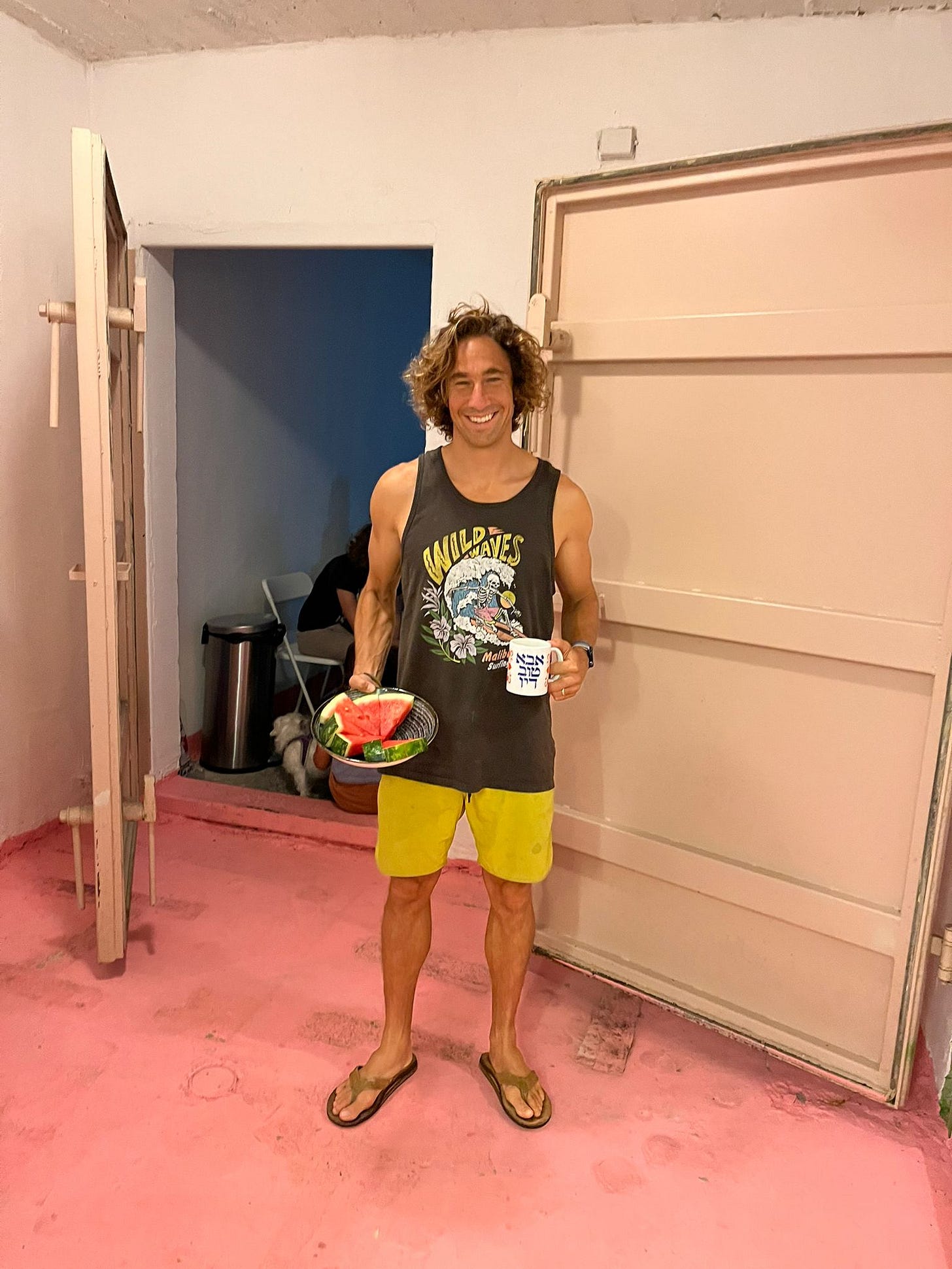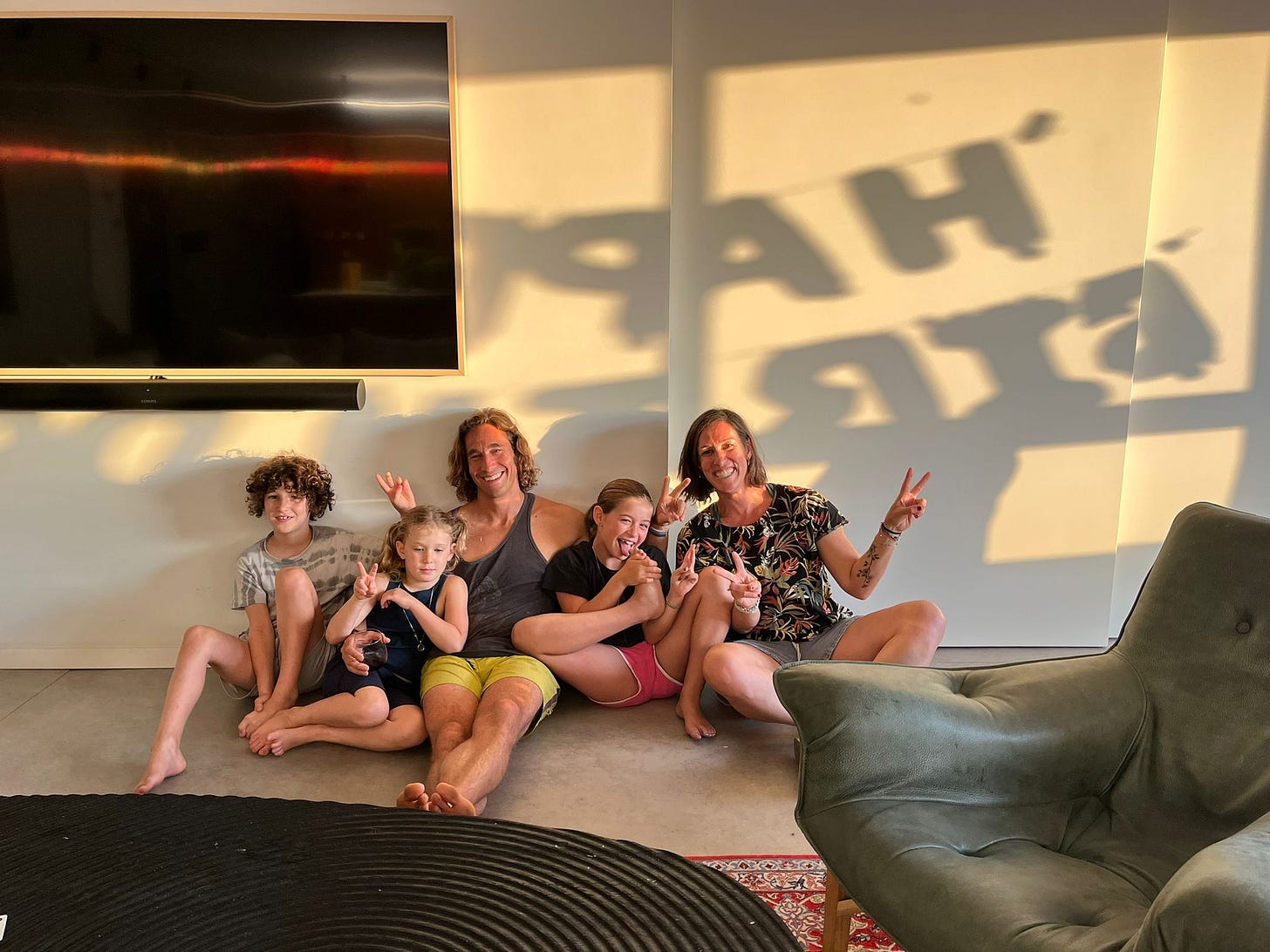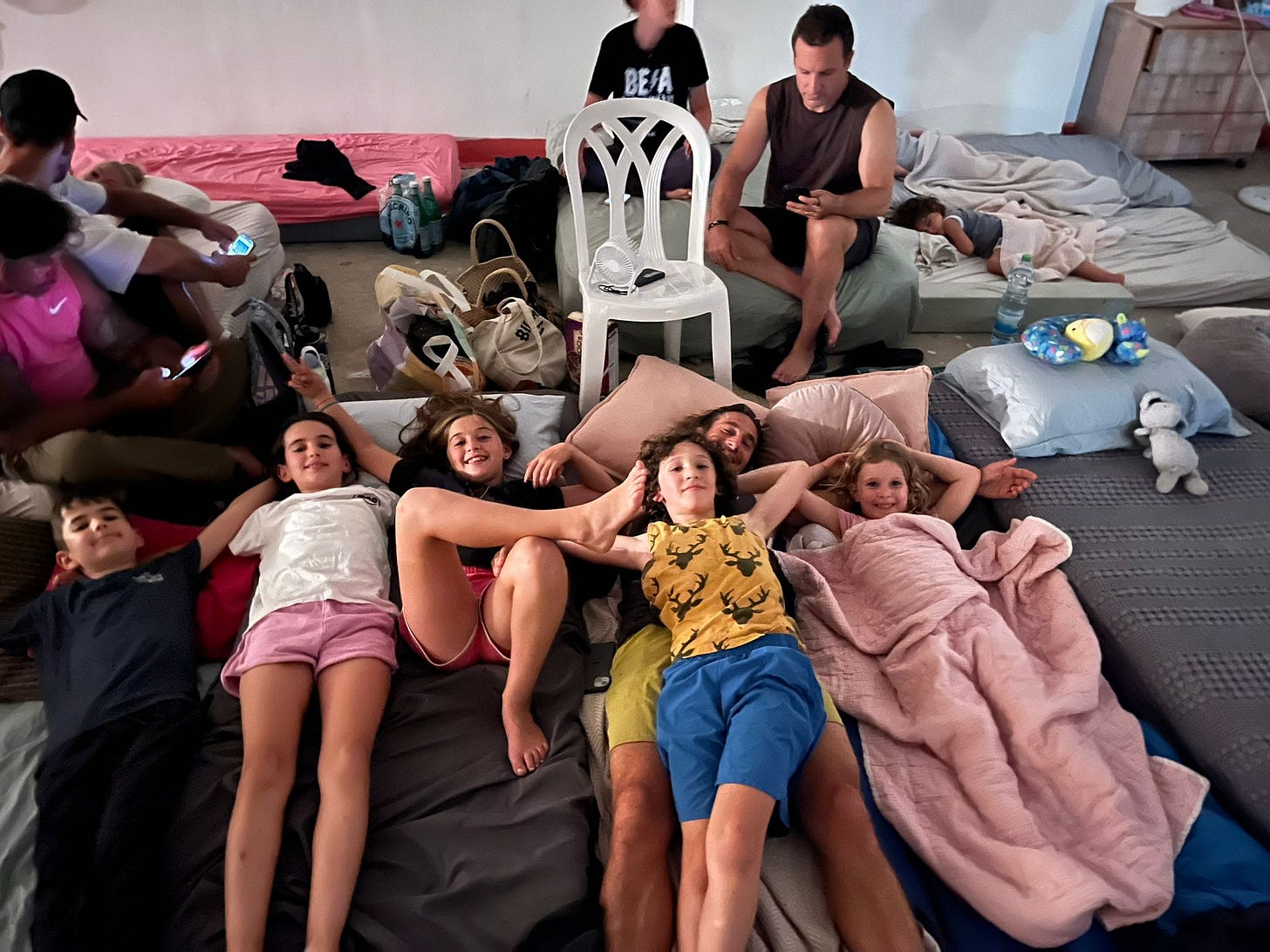What Happens in the Bomb Shelter Stays in the Heart
Channeling Viktor Frankl to build an inner temple of optimism while under bombardment in Tel Aviv.
In the late afternoon of June 12, 2025, I sat for nearly five hours with an Arab octogenarian antiquities expert in the Muslim Quarter of the Old City of Jerusalem, examining ancient artifacts and documenting stories from his highly unusual childhood. This was the 100th and final interview in a series that will published by Hanukkah/Christmas (more on that later).
Just eight hours later, we woke up in the wee hours of Orlee’s birthday to that unmistakable, cacophonic trill blasting from our iPhones: a warning from the Home Front Command of an incoming ballistic missile salvo. This time, however, it was not from the feckless Houthis (which we experience about once per week and shrug off as a minor inconvenience), but straight from the mothership: Iran.
As we ambled down seven flights of stairs into our subterranean bunker, updates swirled from bleary-eyed parents reading aloud from their Telegram channels: Israel’s Air Force had launched a surprise attack on Iran’s nuclear program, pulling out all the stops.
While we do not have a mamad (a reinforced room with a blast door usually found inside modern apartments), we are blessed to have a very large miklat (shared, underground bunker) that can easily accommodate the hundreds of residents who live in our 88-unit tower. In protracted armed conflict, these things really matter. With wifi and a big screen TV, we watched the Tel Aviv skyline light up with explosions, easily recognizing the locations since the city is so small and so familiar.

Orlee’s birthday did not go as planned. We intended for the kids to be in school for their usual half-day Friday, giving us the morning to stroll through the seaside farmer’s market, picking out fresh meat and veggies for her big shabbat dinner with friends.
But we made do. Many grocery stores and bakeries opened for the first half of the day, and we waited in longer than usual lines to stock up. Sadly, we would soon run out of tequila, and the liquor stores were closed. When I texted with friends joking about that being our biggest problem, one of them secretly sent a messenger to bring us a fresh bottle of Patron on a motorcycle. That’s just how it works here: everyone takes care of everyone. We cooked a fantastic meal while the sun set over the Mediterranean, sending an orange glow into our kitchen, and just as we finished doing the dishes, the sirens blared again.
We moved the whole party down to the miklat, and after about an hour of missiles raining down on Israel (most of them intercepted, but some of them making impact with horrific results), I drove some visiting California-based friends down to Shuk HaCarmel, where they hopped out to go back to their AirBNB. Just 48 hours later, that street took a direct hit, and a few buildings and most windows within a 2-block radius were blown to smithereens. Our handyman told me that he is working to secure a damaged museum there, describing a surreal scene: locals sitting on broken chairs, drinking their morning coffee and smoking joints atop a sea of shattered glass.
When Iran launches a ballistic missile, it starts with a boost phase lasting about 60 seconds, climbing up toward the earth’s atmosphere. From there, momentum and gravity take over: it keeps climbing, unpowered, reaching a climax, and then continues its massive arc, essentially falling toward its target. If not intercepted, it will be traveling 3km per second when it lands.
The cover of the New York Times showed a short video of an impact adjacent to the IDF’s headquarters in central Tel Aviv, less than a mile from our home. There was a massive explosion, and a visible shockwave emanating out like an orb of unfettered, deadly energy. In the morning, I swung by the site while on a jog and joined other onlookers to stare at a gaping hole the size of two full apartments right in the middle of a brand new 40+ story residential tower. Stories trickled in through the day: a friend of a friend was on the 30th floor at the moment of impact, pregnant and clutching her small child in the scariest moment of her life, the whole building shaking, the loudest sound they’ve ever heard.
Now a few days in, we’re starting to wayfind into a new, pandemic-like routine: with school canceled and no childcare, we find things for the kids to do, take turns exercising, and then buttress ourselves for another night of bombardment. We have a friend and her two kids sleeping in our living room all week, and every night goes like this: we blast music, everyone dances all around the apartment, we cook dinner, drink tons of cocktails, get the kids exhausted, put them to bed, and then wake up between midnight and 1am to the sirens. We then carry the smallest kids down the seven flights of stairs and make the bigger kids walk. We put on eye masks, and I pass out with all of the kids in our sleeping nest while most of the adults watch the attack unfold on the news.
On the second night, around 3:30am, I woke up briefly with an epiphany: for the first time in my life, I felt ready to die. All boxes checked, no unfinished business, no regrets. But at the same time, I felt an extremely clear sensation that although I am ready to die, I absolutely refuse to do so. And in that fleeting overlap of readiness and refusal, a little space opened up. And in that space, I found gratitude in its purest form.
The next day, the surf came up. I haven’t been checking the report, so it was totally unexpected. There was a since-debunked rumor going around that Iran cannot launch ballistic missiles in the heat of the summer day (the missiles would disintegrate in the air), so we felt confident to do as we pleased under the cover of the hot, yellow sun. I paddled out, smiling from ear to ear, and immediately started lapping big, juicy, perfect waves. Lefts and rights, some steep, some mellow. I would happily encourage others to take waves that should have been mine, feeling a tingling sense of joy while sharing in the abundance.
That day, food tasted better. The palm trees danced in the wind in unison. The sea was even more turquoise. Smiles more sincere. Everything was illuminated.
Yesterday after lunch, we visited friends at their new apartment, which has both a mamad and a miklat. An hour after regaling them with stories from the surf, explaining that missiles can’t launch during the day, we got an incoming missile alert. Having just seen the result of a direct impact to a building, I insisted on going underground into the miklat, and the others reluctantly agreed.
This miklat, however, turned out to be in a private building but for public use. Scores of people poured into the tiny room, which became so packed that nobody could even sit down. It was sweltering and stuffy, and we did our best to entertain the kids while not annoying the horde of random, agitated people in off the street.
One of the kids, a little Israeli girl with British parents, suddenly asked the absolute most terrifying question one could ask in such a setting, made even more hilarious by her British accent: “Who faaaaarted?”
Every night, we can be reasonably certain that some of us will die. There is a culling of the population at play, and it is randomized. Some people are terribly fearful, but most are brave and optimistic. Dark humor abounds.
I look at it like this: the airspace is closed, and you can’t really get out of the country. Some enterprising folks are evacuating through harrowing overland journeys or on yachts, but embarking on such a caper has not crossed my mind even for a second. We’re here. That is a fixed constraint. We can’t control what falls out of the sky and where; all we can do is follow the protocols and hope for the best.
While deep underground late at night, I could go into a state of anxious hyper-vigilance, which will achieve nothing. The other option is to relax into a bubbling hot tub of gratitude, surrounded by the four people I care about the most, and construct the same kind of inner world architecture that Viktor Frankl details in Man’s Search for Meaning.
On Father’s Day, I woke up in a bunker covered in a pile of my own kids. They’re happy, they’re healthy, they love me, it’s all just perfect. The same thing the next day. And the next day, which is today, my 44th birthday, I woke up again, beaming. We get another day! Another day! I’m smothered by my pride of lions, little Lions of Judah, who are even ahead of me in the ways of radical optimism, so brave, so ready for the challenge. Mode ani lefanecha, melech chai vikayam, she’chezarta bi nifsheti, raba emunatecha!
Night after night, we see our neighbors in their pajamas, exhausted from the constant interruption of sleep, traipsing down the stairs. Everyone has their own coping mechanisms, but the wisdom of the crowd is to maintain a positive outlook. For every sigh of despair, there are a hundred audible laughs, high fives, hugs, doors held open for the elderly, and offers to help in any number of ways, to which people almost always accept.
We have our differences - that’s for sure. We are religious and secular, Israeli and foreigner, old and young, right and left. Look right there! The CEO of a $12.5B software company sitting next to a Filipino domestic worker caring for a 90-year-old. A liberal female rabbi sitting next to a Bibi supporter. But in the bomb shelter, our perception of similarity dwarfs our perception of difference. We are on the same airplane, up in the sky, heading for an unknown destination that none of us can impact, and all we have, all we really have in this world is right here, right now. And that’s all we really need.






